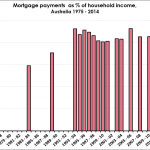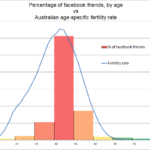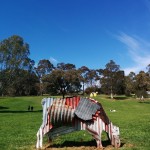Two sides of a growth

With all the talk of wage stagnation, you’d be forgiven for thinking Australia lives in struggle town. Yet, incomes have increased so rapidly that today’s full-time median wage would put you in the top quartile 20 years ago!
Real growth
While growth slowed down over the past couple of years, Australians’ income is coming off two decades of boom. The average full-time wage (inflation adjusted) has increased by 41% over the period. This means that even with the increased cost of living, the average Australian worker can now buy almost half as much more stuff than in the late 90s.
But averages only paint a slither of the picture. More impressive is how the increase has permeated across all income levels (albeit to different degrees).
When spreading fulltime workers across an earning continuum, the past two decades have basically moved everyone up at least 20 percentile points.
Today’s median income (the 50th percentile) would put you above the 75th income percentile in 1996. And you only need to be around the 65th percentile to have an income equivalent to that of the top 10th percentile in 1996. Potentially most importantly, today’s poorest 10th percentile earns more than the 30th percentile did in 1996.
Does this mean Australia has eradicated the bottom 20 percentile of workers?
It depends on how you look at it.

A graph may paint a thousand words, but which words depend on your point of view.
Seen through a prism of ‘absolute’ progress, the graphs above suggest Australia has improved drastically. People are richer, and those on the lowest wages are much better off than they used to be.
Those primed for this view of the world will no doubt take that message from this story and have a reinforced idea that the world is getting better; we’re on the right path.
Relative growh
However, seen through a ‘relative’ prism of equality, the graphs highlight the growing gaps between the “haves and the have nots” (even if the have nots have much more than the have nots used to).
The boom was not felt equally.
While the median income increased by 35%, the income of the top decile increased by almost 50%. Meanwhile the 10th percentile increased by 25%. In 1996, the 90/10 percentile ratio was 255%. 20 years later the gap widened to 305%. While the real difference is narrowed by the taxes upon this incomes, it’s fair to say that income inequality has increased.
Real vs Relative
Most people are much better off than before. Yet, many still feel worst in comparison to those around them. The progress and improvements in our lives pale in comparison to comparisons themselves. This may be explained by behavioural economics better than the traditional variety. Perhaps comparing ourselves to those around us might be easier and more front of mind than accurately remembering the past. Perhaps it’s our bias towards feeling losses harder than gains. Whatever the case, I don’t think enough attention is being paid to all the things we have, and too much is being focused on what we’re missing out on. Should we not find a way to enjoy the situation we are in, and not let “comparisons be the thief of joy”1.
We have never lived in an age of such generalised affluence.Our standards and expectations are beyond what any previous generation dreamed of. The growing income, and more importantly wealth inequality are hugely important issues. But we should acknowledge the other side of the graph. Partisans often ignore one point of view fearing it will diminish their own. But ignoring the progress, or overly focusing on the negatives, misleads people to thinking we’re worst off than we are. We start feeling self-pity and fail to acknowledge our place in the world. We should continue to work towards a fairer world, but not at the cost our capacity to enjoy what we have.
Australia is not only at its richest point in time, it’s also among the richest in the place (world). Perhaps by acknowledging how far we’ve come, we can start paying more attention to helping those beyond our coast lines.
We should fight to make this a better world, but we should not ignore the fact that our world, our time and place, is heaps good.
Sources:
All income data from :
ABS’s Employee Earnings and Hours, Australia
2016: http://abs.gov.au/AUSSTATS/abs@.nsf/DetailsPage/6306.0May%202016?OpenDocument
1996: http://www.ausstats.abs.gov.au/ausstats/free.nsf/0/CE23DC841D70810FCA25722500073754/$File/63060_0596.pdf
1: Disputed quote from Theodore Roosevelt – https://en.wikiquote.org/wiki/Theodore_RooseveltQuote from



















